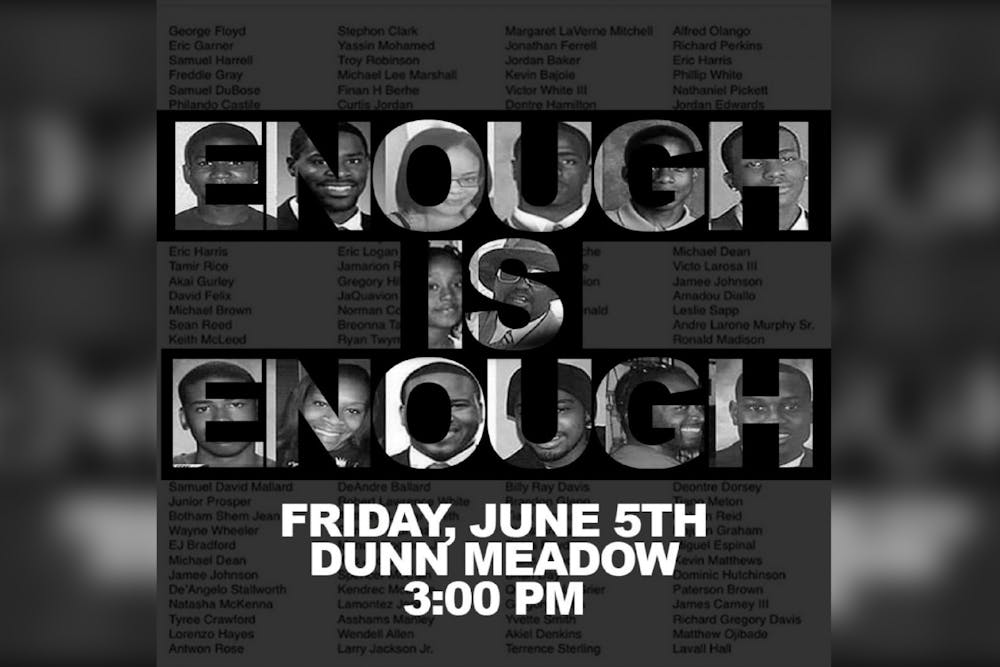When Selena Drake first heard about the video of George Floyd being killed by a police officer in Minneapolis on May 25, she refused to watch it. She was tired of continuously hearing about police brutality and the seemingly endless protests that followed.
But the next day, Drake, a recent black IU graduate and now graduate student, changed her mind and watched the video. She was struck by the manner in which Floyd was killed — not by a gun, but by an officer’s knee.
“You saw this man’s life literally leave his eyes,” Drake said.
Drake took to Twitter on Tuesday, posting that she had decided to plan a protest. Her phone would not stop going off for the next two days. She now has over 100 volunteers, people planning to come from all over the state and several local groups supporting the event.
Set up and sign-making for the peaceful protest will begin at 1 p.m. Friday in Dunn Meadow, speakers will begin at 2 p.m. and the march will begin at 3 p.m.
Protesters will walk west down Seventh Street and end at the square where different activities will be spread across three sides of the courthouse to maintain social distancing. Main speakers will be on one side, opportunities to make signs and art will be on another side and a space to remember the lives that have been lost to police brutality with pictures, candles and signs will be on the third side.
People may also participate in their cars, the organizers said. Those who have kids, disabilities, are immunocompromised or do not want to be in large crowds due to COVID-19 can decorate their cars and drive behind the protesters, serving as added protection.
“We’re challenging blackness as monolithic by allowing all these different parties to take part in it,” said Ky Freeman, a rising IU junior and another main organizer.
Freeman said he admires the strategy and planning that went into the civil rights protests in the '60s, and as a queer, black man, he came up with the option to drive in the protest as a way to include more people in Friday’s march.
Chelsea Fitzpatrick, a rising IU-Purdue University Indianapolis junior, said the march isn’t just to draw awareness outside the black community about police brutality. It’s also to show the black community she and the other organizers are committed to social justice and reform.
“This protest means a lot to me because I want our community to see that this is the next generation of Fannie Lou Hamers, of Martin Luther Kings, of Malcom Xs, of Marcus Garveys, of Angela Davis’, the next generation of activists,” Fitzpatrick said.
The organizers said they want the march to have a lasting impact. They have goals they want to accomplish within the Bloomington community and wish to turn people’s anger into a passion to help. They will focus protesters’ attention on creating more civilian oversight over the police, educating themselves on candidates who stand for social justice, voting, supporting black businesses and removing barriers to report police misconduct.
“We’re in a position where we can actually create change in our community,” Drake said. “And if we can do that, we will do that in the most peaceful way.”
Fitzpatrick said the compounding deaths of Sean Reed, whom she went to school with and who was shot by an Indianapolis police officer May 6, Breonna Taylor, who was killed in March, and the publicity of Ahmaud Arbery’s death in early May made the death of George Floyd the last straw.
“The hurt and the sadness left, and it was replaced by anger,” Fitzpatrick said. “I’m frustrated with the way our country views black lives and views black bodies.”
The organizers emphasized the importance of white people being accomplices instead of allies.
“For me, I think an accomplice is somebody that is not speaking for you but is speaking with you,” Fitzpatrick said. “For me, that’s also someone who’s not trying to write your narrative but be the person reading and sharing your narrative. It’s also someone who includes me when they share my narrative.”
The organizers said they have found many people like this wanting to help.
“It takes a great deal of humility to say, ‘I don’t understand what’s going on or know what’s going on, but how can I help?’” Freeman said.
Speakers for the event include Charlie Nelms, an activist and former IU vice president and professor; Rev. Jimmy Moore, a pastor at St. Mark’s United Methodist Church; Jennifer Crossley, chairwoman of the Monroe County Democratic Party; Shatoyia Moss, safe and civil city director for the City of Bloomington and several other community leaders and students.
Drake credited IU rising senior Salina Tesfagiorgis for planning the safety features of the protest. There will be a first aid station and over 500 donated masks. All protesters are strongly encouraged to bring their own masks, organizers said. Gloves will also be given to anyone using markers to create signs.
The organizers have talked with the Bloomington Police Department about how to keep everyone safe during the protest.Drake said officers won't be hovering over protesters but they are aware of the event.
“The police department has been nothing but open and willing to help us during our fight,” Drake said about BPD. “They’re really diligent in making sure we’re safe, so that’s a big, big factor for us.”
All of the organizers emphasized their understanding of the anger and sometimes lawless activities happening around the country in response to recent police brutality incidents. But on Friday, they will work to make sure the protest does not turn violent.
“We’re channeling all of our anger, because anger sometimes equates to passion, into a peaceful protest when nothing about anger itself is peaceful,” Freeman said. “The way I feel is not serene in any way shape or form, but I’m being challenged to be peaceful.”




